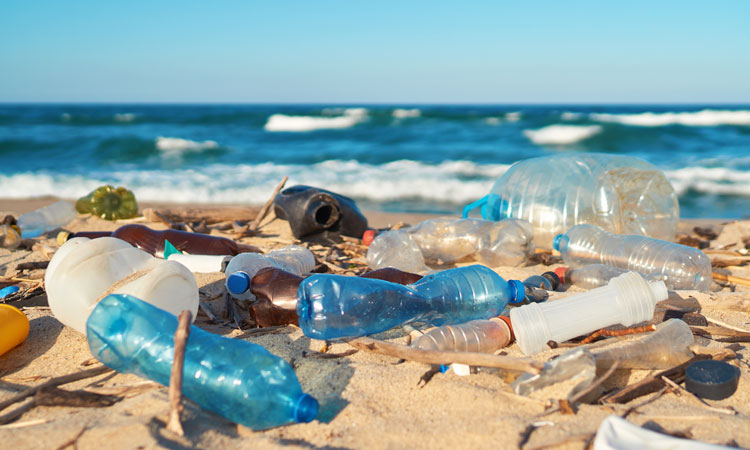Who is responsible for plastic waste?

Plastic packaging waste – such as plastic bottles, plastic food wrapping and plastic bags – is everywhere. A new study that sought to explore the global patterns of such waste found that the US, Brazil, Europe and China are the top producers of plastic pollution.
“We wanted to follow the plastic packaging waste embedded in the global supply chain,” said Sandy Dall’erba, Professor in the Department of Agricultural and Consumer Economics (ACE), director of the Center for Climate, Regional, Environmental and Trade Economics (CREATE) at the University of Illinois and co-author of the study. “This work allows us to conclude the problem is a responsibility shared between economic agents, from the producers and their intermediaries to the retail stores and the consumers.”Read More : Scientists make plastic more degradable under UV light Dall’erba and his colleagues measured plastic packaging waste transaction flows based on a global, multiregional input–output database called EXIOBASE, combined with World Bank data. The researchers found North and South America together generate 41 percent of the world’s production of plastic packaging waste, whilst Europe produces 24 percent, ranking second, and Asia closely behind with 21 percent, most of which is generated in China (12 percent).
“High-protein food such as meat, fish, and dairy is a trademark in the Americas and those generate a lot of plastic packaging waste,” Dall’erba explained. “For instance, every kilogram (2.2 lbs.) of fish consumed will lead to an average of about 1.6 kg (2.5 lbs.) waste. This includes plastic bags, trays, and cellophane used to wrap and cover the fish during transportation, storage, and sales.”
International exports further exacerbate the problem, accounting for about 25 percent of global plastic packaging waste, according to the researchers.
“Plastic is not easy to replace. There is no other material to protect the freshness of a food product that will be shipped around the world,” Dall’erba stated. “We need to further develop technologies that make plastics more biodegradable, such as products based on algae. But we also need stricter regulations to discourage plastic packaging production and use.”
The researchers conclude producers and consumers must share responsibility and costs. “All agents along the supply chain and final consumers need incentives to reduce plastic use. Some examples are taxes on waste management or refunds for returning plastic bottles,” explained Xiang Gao, the paper’s lead author, and researcher at the Academy of Mathematics and Systems Science, Chinese Academy of Sciences (CAS) in Beijing, China. “Consuming locally grown, seasonal food would help, and so would better transparency about the true recyclability associated with the resin identification code stamped on plastic packaging.”
“We wanted to follow the plastic packaging waste embedded in the global supply chain,” said Sandy Dall’erba, Professor in the Department of Agricultural and Consumer Economics (ACE), director of the Center for Climate, Regional, Environmental and Trade Economics (CREATE) at the University of Illinois and co-author of the study. “This work allows us to conclude the problem is a responsibility shared between economic agents, from the producers and their intermediaries to the retail stores and the consumers.”
“High-protein food such as meat, fish, and dairy is a trademark in the Americas and those generate a lot of plastic packaging waste,” Dall’erba explained. “For instance, every kilogram (2.2 lbs.) of fish consumed will lead to an average of about 1.6 kg (2.5 lbs.) waste. This includes plastic bags, trays, and cellophane used to wrap and cover the fish during transportation, storage, and sales.”
International exports further exacerbate the problem, accounting for about 25 percent of global plastic packaging waste, according to the researchers.
“Plastic is not easy to replace. There is no other material to protect the freshness of a food product that will be shipped around the world,” Dall’erba stated. “We need to further develop technologies that make plastics more biodegradable, such as products based on algae. But we also need stricter regulations to discourage plastic packaging production and use.”
The researchers conclude producers and consumers must share responsibility and costs. “All agents along the supply chain and final consumers need incentives to reduce plastic use. Some examples are taxes on waste management or refunds for returning plastic bottles,” explained Xiang Gao, the paper’s lead author, and researcher at the Academy of Mathematics and Systems Science, Chinese Academy of Sciences (CAS) in Beijing, China. “Consuming locally grown, seasonal food would help, and so would better transparency about the true recyclability associated with the resin identification code stamped on plastic packaging.”
Source: www.newfoodmagazine.com
Useful Links:
